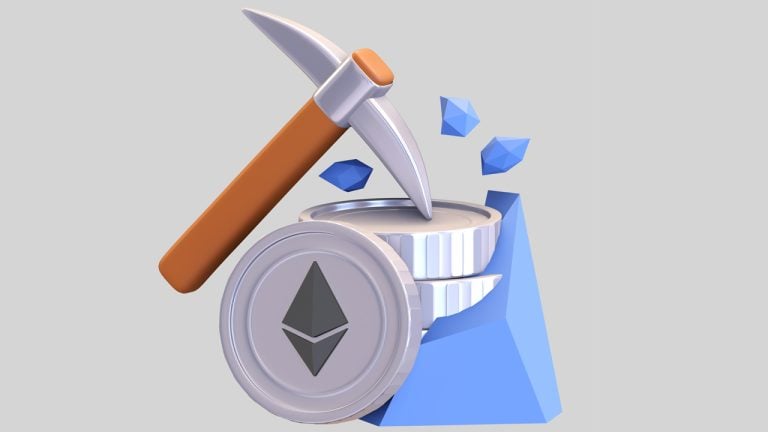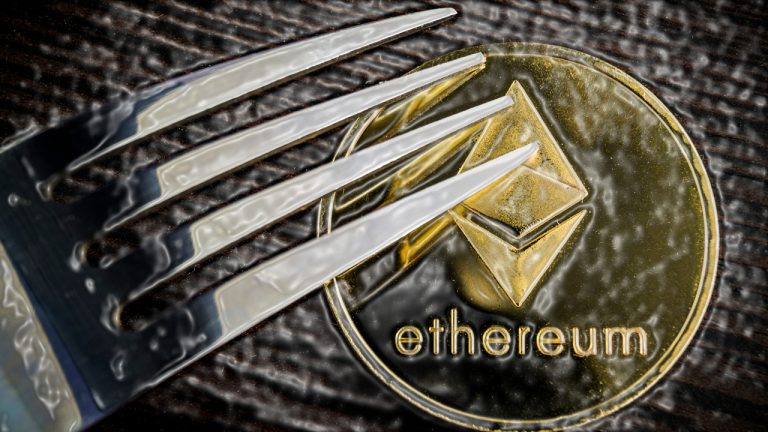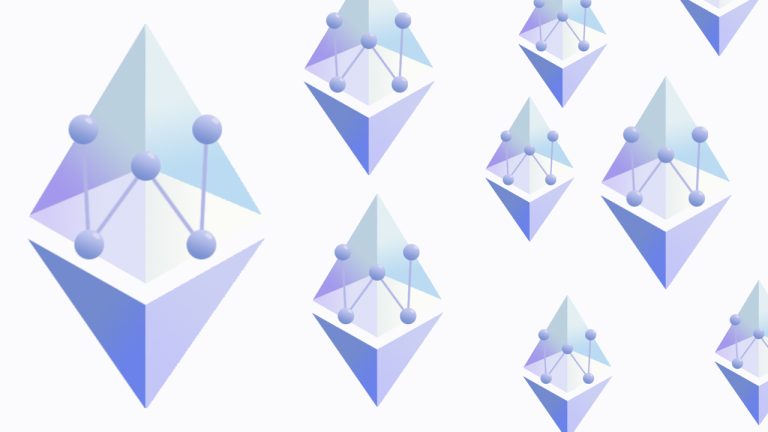
Singapore-based digital assets exchange Crypto.com is rolling out support for the newly forked Ethereum (ETH) proof-of-work token and one Web3 lifestyle altcoin. The exchange’s customers can now trade EthereumPoW (ETHW), which aims to operate in the same way as pre-merge Ethereum, which existed on a proof-of-work blockchain. ETHW is trading at $6.26 at time of […]
The post Crypto.com Adds Trading Support for Newly Forked EthereumPoW (ETHW) Token and Web3 Lifestyle Altcoin appeared first on The Daily Hodl.
 The U.S. dollar value of the recently airdropped coin native to the forked Ethereum proof-of-work (PoW) blockchain will be at par with that of ether, Chandler Guo, the instigator of the latest Ethereum hard fork, has said. Guo added that he expects the value of the token, which is currently “very cheap,” to grow by […]
The U.S. dollar value of the recently airdropped coin native to the forked Ethereum proof-of-work (PoW) blockchain will be at par with that of ether, Chandler Guo, the instigator of the latest Ethereum hard fork, has said. Guo added that he expects the value of the token, which is currently “very cheap,” to grow by […]
The proof-of-work fork of the Ethereum blockchain was targeted by a cross-chain contract exploit.
Post-Ethereum Merge proof-of-work (PoW) chain ETHW has moved to quell claims that it had suffered an on-chain replay attack over the weekend.
Smart contract auditing firm BlockSec flagged what it described as a replay attack that took place on Sept. 16, in which attackers harvested ETHW tokens by replaying the call data of Ethereum’s proof-of-stake (PoS) chain on the forked Ethereum PoW chain.
According to BlockSec, the root cause of the exploit was due to the fact that the Omni cross-chain bridge on the ETHW chain used old chainID and was not correctly verifying the correct chainID of the cross-chain message.
Ethereum’s Mainnet and test networks use two identifiers for different uses, namely, a network ID and a chain ID (chainID). Peer-to-peer messages between nodes make use of network ID, while transaction signatures make use of chainID. EIP-155 introduced chainID as a means to prevent replay attacks between the ETH and Ethereum Classic (ETC) blockchains.
1/ Alert | BlockSec detected that exploiters are replaying the message (calldata) of the PoS chain on @EthereumPow. The root cause of the exploitation is that the bridge doesn't correctly verify the actual chainid (which is maintained by itself) of the cross-chain message.
— BlockSec (@BlockSecTeam) September 18, 2022
BlockSec was the first analytics service to flag the replay attack and notified ETHW, which in turn quickly rebuffed initial claims that a replay attack had been carried out on-chain. ETHW made attempts to notify Omni Bridge of the exploit at the contract level:
Had tried every way to contact Omni Bridge yesterday.
— EthereumPoW (ETHW) Official #ETHW #ETHPoW (@EthereumPoW) September 18, 2022
Bridges need to correctly verify the actual ChainID of the cross-chain messages.
Again this is not a transaction replay on the chain level, it is a calldata replay due to the flaw of the specific contract. https://t.co/bHbYR4b2AW pic.twitter.com/NZDn61cslJ
Analysis of the attack revealed that the exploiter started by transferring 200 WETH through the Omni bridge of the Gnosis chain before replaying the same message on the PoW chain, netting an extra 200ETHW. This resulted in the balance of the chain contract deployed on the PoW chain being drained.
Related: Cross-chains in the crosshairs: Hacks call for better defense mechanisms
BlockSec’s analysis of the Omni bridge source code showed that the logic to verify chainID was present, but the verified chainID used in the contract was pulled from a value stored in the storage named unitStorage.
The team explained that this was not the correct chainID collected through the CHAINID opcode, which was proposed by EIP-1344 and exacerbated by the resulting fork after the Ethereum Merge:
“This is probably due to the fact that the code is quite old (using Solidity 0.4.24). The code works fine all the time until the fork of the PoW chain.”
This allowed attackers to harvest ETHW and potentially other tokens owned by the bridge on the PoW chain and go on to trade these on marketplaces listing the relevant tokens. Cointelegraph has reached out BlockSec to ascertain the value extracted during the exploit.
Following Ethereum's successful Merge event which saw the smart contract blockchain transition from PoW to PoS, a group of miners decided to continue the PoW chain through a hard fork.
 Following Ethereum’s Merge, a number of cryptocurrency community members have been discussing the proof-of-work (PoW) fork called ETHW as it dropped significantly in value during the past few days. However, a lot of people are unaware that there’s another Ethereum-based PoW fork called ethereumfair (ETF), and ETF has gathered a small amount of hashrate and […]
Following Ethereum’s Merge, a number of cryptocurrency community members have been discussing the proof-of-work (PoW) fork called ETHW as it dropped significantly in value during the past few days. However, a lot of people are unaware that there’s another Ethereum-based PoW fork called ethereumfair (ETF), and ETF has gathered a small amount of hashrate and […] A Securities and Exchange Commission filing filed on September 16 shows that the company Grayscale Investments has declared “distribution of rights to Ethereum Proof of Work Tokens.” The newly launched ETHW blockchain went live on September 15 and roughly 50-60 terahash per second (TH/s) of hashrate is dedicated to the new network. Grayscale notes that […]
A Securities and Exchange Commission filing filed on September 16 shows that the company Grayscale Investments has declared “distribution of rights to Ethereum Proof of Work Tokens.” The newly launched ETHW blockchain went live on September 15 and roughly 50-60 terahash per second (TH/s) of hashrate is dedicated to the new network. Grayscale notes that […] Following Ethereum’s transition from proof-of-work (PoW) to proof-of-stake (PoW) roughly five different crypto assets were the main beneficiaries of Ethereum’s former hashrate. However, 24 hours after The Merge, anonymous developers launched an Ethereum PoW fork called ETHW and the fork has managed to garner 60.92 terahash per second (TH/s) of hashpower. However, ETHW has lost […]
Following Ethereum’s transition from proof-of-work (PoW) to proof-of-stake (PoW) roughly five different crypto assets were the main beneficiaries of Ethereum’s former hashrate. However, 24 hours after The Merge, anonymous developers launched an Ethereum PoW fork called ETHW and the fork has managed to garner 60.92 terahash per second (TH/s) of hashpower. However, ETHW has lost […]We are pleased to announce that Kraken now supports EthereumPoW (ETHW). Funding and Trading Trading is live and the ETHW token has been distributed to eligible clients. A further announcement will be made once Funding is live, at which point you will be able to…
The post EthereumPoW (ETHW) trading starts now + token distribution appeared first on Kraken Blog.
 While The Merge is expected to take place in less than two days, the Ethereum proof-of-work (PoW) fork is scheduled to go live 24 hours after the transition, according to ETHW developers. On August 8, 2022, ETHW exchanged hands for $141 per unit and today the crypto asset is down 73% lower in USD value. […]
While The Merge is expected to take place in less than two days, the Ethereum proof-of-work (PoW) fork is scheduled to go live 24 hours after the transition, according to ETHW developers. On August 8, 2022, ETHW exchanged hands for $141 per unit and today the crypto asset is down 73% lower in USD value. […]
A lack of oracle support, the majority of DApps being supportive of the Merge and Ethereum Classic's minimal developer activity suggests that PoW hard forks will fizzle.
Ether (ETH) is the second largest crypto by market capitalization and the absolute leader in decentralized applications by deposits. Becoming a victim of its own success, the network experienced a fee hike in November 2021 when the average transaction costs surpassed $50.
That's precisely why the Merge is a critical step to implementing a fully functional scaling solution. The confirmation of a transition to a proof-ofstake (PoS) consensus was the main driver for the rally toward $2,000 on Aug. 15.
Investors were partially excited about the reduced issuing schedule and likely a transition to a deflationary scenario, but there's also the expectation of upcoming forks. As a result, hard-forked coins may be awarded to Ether holders on different blockchains, even though there's no guarantee those will find traction or sufficient liquidity.
From one side, there's the temptation of free money and even bonus non-fungible tokens (NFTs) as the forked chain will initiate with the same state of the original Ethereum network, meaning each address will hold the exact same contents in terms of tokens and transaction history.
On the other hand, there's also a sense of disappointment after Ether’s agonizing 29% correction that took place after the $2,000 resistance proved to be more challenging than expected. It’s possible that as investors realized that the practical utility of the forks would be much lower than anticipated, the exuberant expectation of free money dissipated, and reality kicked in.
ETHPoW, for now, is a possible new chain backed by proof-of-work (PoW) miners. Some exchanges have initiated futures trading for the fork chain native asset, ETHW. Markets seem to have given their opinion, as the contract is now trading below $55 at Poloniex and Gate.io.
The two leading stablecoins, namely USD Coin (USDC) and Tether (USDT), have officially confirmed intentions to exclusively support the Ethereum Foundation-backed Merge chain. Cointelegraph previously reported that given that the two stablecoins dominate, the issuers' support "should result in a smooth transition for Ethereum."
Meanwhile, the core team behind EthereumPoW (ETHW) said they would temporarily freeze tokens in certain liquidity pools of DeFi applications to protect user assets after the hard fork.
The idea of freezing users' assets without their consent didn't go well with many. Some users called the Twitter account behind EthereumPoW a scam because the community has voted on no such change.
DApps go beyond merely facilitating transactions because, as they interact with external data, request off-chain computing and this is where blockchain oracle technology comes into play.
Chainlink enhances smart contracts by linking them with real-world data, events and transactions. In an official announcement on Aug. 8, the protocol revealed that its services would remain on the Ethereum PoS blockchain which is supported by the Ethereum Foundation.
Related: MakerDAO co-founder recommends DAI-USD depegging to limit the attack surface
On Aug. 16, Aave (AAVE) holders were asked to take part in voting to" commit" to Ethereum's PoS consensus, giving power to an authority to shut down any Aave deployments on any alternative Ethereum forks.
Despite being designed exclusively as an Ethereum application, Aave has become interchain over the years and currently has its official versions running on Avalanche, Arbitrum, Optimism, Polygon, Fantom and Harmony.
Investors are starting to realize that the DApps and stablecoins will not support forked chains, meaning the “free” tokens and NFTs are less likely to be accepted in marketplaces and leading DeFi applications. Regardless of the ETHPoW token value, the utility of the PoS network supported by the Ethereum Foundation far exceeds the utility of competing chains.
Ethereum Classic (ETC) is a pre-existing example that supports the thesis that a competing chain will not undermine Ether's (ETH) price. The original hard fork followed a 2016 consensus change and aimed to reverse a $60 million exploit. The DApps on this competing proof-of-work (PoW) chain never gained traction despite its $4.5 billion market capitalization.
Current data suggests that Ether traders should disregard the upcoming forks and focus on the roadmap toward scalability and whether or not the network maintains its position as the leader by total value locked.
The views and opinions expressed here are solely those of the author and do not necessarily reflect the views of Cointelegraph. Every investment and trading move involves risk. You should conduct your own research when making a decision.